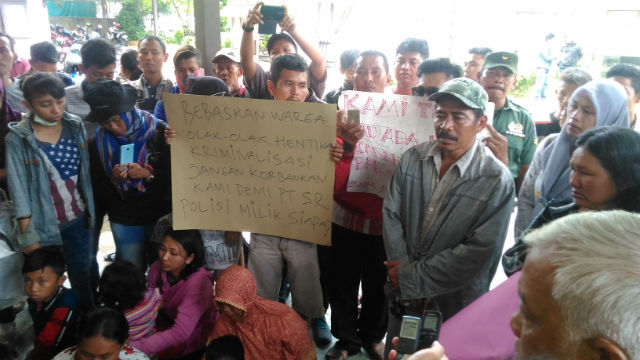Just two months into 2018, regional advocacy group PAN Asia Pacific (PANAP) has noted with deep concern the continuing and intensifying attacks against rural communities in the region.
In the Philippines, farmers, indigenous peoples, and land rights activists continue to suffer from human rights violations under the Duterte administration. From January to February 2018 alone, PANAP has already monitored at least 10 politically-motivated killings, mostly in Mindanao, where the extended imposition of martial law has resulted in the further militarization of communities.
Among the latest victims was Ronald Manlanat, a member of National Federation of Sugar Workers (NFSW), an organization affiliated with PANAP partner Kilusang Magbubukid ng Pilipinas (KMP) in Sagay City, Negros Oriental. He was shot in the head by unidentified gunmen on February 23 while working on land which was part of Hacienda Joefred but was placed under the Comprehensive Agrarian Reform Program (CARP). It remained undistributed to land reform beneficiaries for years, however, that Manlanat and fellow beneficiaries forcibly occupied and cultivated the land in 2009. He had previously received death threats for his active involvement in organizing his community to collectively assert their right to land.

Manlanat was the second victim of killings of farm workers connected with NFSW in Sagay City. In December 2017, Flora Gemola, the chairperson of the local NSFW chapter, was stabbed to death by unidentified assailants.
Illegal arrests, illegal detention, and trumped up charges are also among the human rights violations that farmers, indigenous peoples, and land rights activists in the Philippines continue to face. According to KMP, around 200 people have been illegally arrested and detained “based on fake intelligence, fake warrants, and fake charges” under the current administration. Most of them are members and leaders of farmer and indigenous communities. Roger Gonzales, for instance, is a member of KMP-affiliated Nagkahiusang Mag-uuma sa Agusan del Sur (NAMASUR-KMP). He was arrested on February 23 in Talacogon, Agusan del Sur, allegedly for violating the Comprehensive Law on Firearms and Ammunition. He was also tagged as a member of the New People’s Army, a common accusation made against members of communities actively resisting land grabbing and militarization.
In Indonesia, those fighting for their right to land similarly face illegal arrests, illegal detention and trumped up charges, as well as, physical assault.
On February 22, Kawan Ayub, chairperson of PANAP partner Aliansi Gerakan Reforma Agraria (AGRA) chapter in Olak-Olak village in Kubu Raya, West Kalimantan was arrested without warrant in the middle of the night by six non-uniformed police officers. AGRA believes that the illegal arrest and continuing detention of Ayub is connected to the Olak-Olak village people’s struggle against the grabbing of their land by large oil palm plantation companies PT Sintang Raya and PT Cipta Tumbuh Berkembang (CTB). Both companies were able to acquire permits to set up plantations in 11,130 hectares and 13,659 of land respectively, part of which are on farmers’ and indigenous peoples’ lands in nine villages.
In Central Java, 24 people were arrested and 28 others were injured after the police violently dispersed a protest action being held by communities in Gunung Slamet in October last year against the drilling activities of Sejahtera Alam Energi (SAE) for the Baturaden Geothermal Power Plant (PLTP) project. The communities rejected the project from the beginning as it will inevitably result in the displacement of farmers and indigenous peoples, as well as, the destruction of the environment and thus of the peoples’ source of livelihood. The PLTP project has already resulted in deforestation, damage to agricultural lands, pollution of rivers and other water sources, and disasters such as floods and landslides.
In Kulon Progo, Yogyakarta, where the national government is planning to build a new international airport, human rights violations abound to intimidate communities resisting the project. Villagers and their supporters from outside the regency have been subjected to different forms of harassment, such as illegal arrests and detention and physical assault during protest actions and evictions. In January, at least 15 people were beaten – two of whom were hospitalized – by the police deployed during one of the evictions.
PANAP renewed its call for the Philippine and Indonesian governments to address these attacks reportedly carried out by state forces, and to make accountable those responsible. It also urged the Duterte and Jokowi administrations to implement policy reforms, including a genuine agrarian reform program, that would stop land and resource grabbing. #
For more information, please contact Abby Valenzuela at abby.valenzuela@panap.net








Discussion about this post